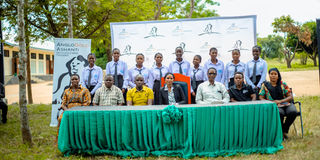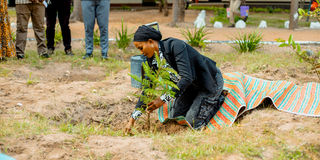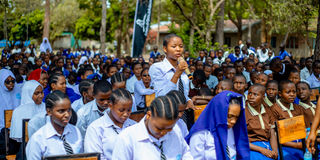GGML: Pioneering a greener future in Tanzania

Special Seats Councilor for Kasamwa Ward, Ms Diana Magayane (seated centre) in a group photo with GGML’s representative and Kasamwa Secondary School’ students and teachers during the Interschool Debate organized by GGML in commemoration of World Environment Day in Geita Region.
As the world celebrates World Environment Day 2025 under the theme “Ending Plastic Pollution”, Geita Gold Mine (GGML), a subsidiary of AngloGold Ashanti, reaffirms its bold commitment to environmental protection, sustainability, and responsible mining in Tanzania.
Amidst a global push for climate action and conservation, GGML stands as a shining example of how modern mining can align with nature, not work against it.
A mining company with a green heart
At its core, World Environment Day is a global call to protect the planet we all share. For GGML, the 2025 theme hits home. “Ending Plastic Pollution” echoes through the company’s environmental strategy and values. It’s not just a slogan—it’s a mission.
“We see this as a critical moment. Plastic pollution is a tangible challenge, but also an opportunity for us to step up. We’re aligning our operations with circular economy principles, aiming to minimize waste, repurpose materials, and support cleaner, greener communities,” says Yusuph Mhando, GGML Environment Manager.
Tackling real environmental challenges
Operating in the heart of the Geita Region, GGML faces—and tackles—environmental challenges that many mining companies shy away from.
These include: Combating deforestation caused by unregulated human activities, managing mining-related pollution and municipal waste, reducing the use of single-use plastics in partnership with local stakeholders, protecting local water sources and promoting conservation and supporting communities in adapting to climate change through reforestation and awareness programmes.
These are not just tick-box exercises. GGML’s approach is strategic, science-driven, and deeply community-centered.

Special Seats Councilor for Kasamwa Ward, Ms Diana Magayane plants a tree at Kasamwa Secondary School during the Interschool Debate organized by GGML in commemoration of World Environment Day in Geita Region.
From reforestation to rehabilitation
One of GGML’s most impactful initiatives is its large-scale afforestation program, through which the company plants thousands of indigenous trees annually.
This is complemented by progressive land rehabilitation, where mined-out areas are restored with natural vegetation, helping re-establish biodiversity and combat erosion.
Water is another priority. GGML has invested in modern water treatment facilities that ensure wastewater released from mining operations meets both Tanzanian and international standards.
The mine has also reduced its reliance on freshwater sources by recycling process water from its Tailings Storage Facility (TSF).
And it doesn’t stop there. Waste segregation facilities have been installed both on-site and across Geita Municipality to help manage solid waste—especially plastics—more effectively.
GGML’s commitment to waste reduction and plastic accountability has made it a leading voice in the fight against pollution.
Innovation meets sustainability
To reduce its environmental footprint, GGML has embraced innovation. The mine is now connected to Tanzania’s national power grid, significantly lowering its reliance on diesel generators and slashing carbon emissions.
It also uses digital monitoring systems to track air, water, and noise pollution in real-time—ensuring quick response and continuous improvement.
Another area of advancement is the digital tracking of waste streams, especially plastics and hazardous materials. This ensures greater transparency and allows the company to refine its waste management processes, reducing risks to both people and the planet.
Community at the Centre
Environmental sustainability at GGML extends far beyond mine boundaries. The company believes that true environmental change starts with people, and has invested heavily in community engagement and education.
Local schools, women’s groups, and youth associations are involved in training sessions on climate change, waste management, and conservation.
Take, for example, the Local Seedling Nurseries Initiative, where community members are supported to grow tree seedlings that are later used to rehabilitate mined land. It’s a win-win: economic empowerment through green jobs, and a healthier ecosystem for future generations.
Communities along the water pipeline from Lake Victoria also benefit from improved access to clean water, thanks to GGML’s investments in sustainable water infrastructure.
In rural areas, sustainable agriculture and agroforestry programmes supported by GGML are helping farmers boost crop yields while conserving soil and minimizing environmental degradation.

A student speaks during the Interschool Debate organized by GGML in commemoration of World Environment Day in Geita Region.
Learning from the past, committing to the future
The environmental journey hasn’t always been easy. But it has taught GGML valuable lessons: that early community involvement leads to better project outcomes, that science and data must guide decisions, and that partnerships—with government, NGOs, and academia—are essential for long-lasting impact.
Looking ahead, GGML is not slowing down. The company is aligning with AngloGold Ashanti’s global goal of achieving net-zero emissions, scaling up investments in climate-smart technologies, expanding its biodiversity action plans, and committing to a water stewardship program that safeguards this precious resource.
A call to action
On this World Environment Day, GGML sends out a clear and urgent message: The planet doesn’t need more promises—it needs progress. The company invites all stakeholders—corporates, communities, and citizens—to take tangible steps toward ending plastic pollution and protecting our shared environment.
As Tanzania pushes forward in its development journey, GGML remains committed to empower people and advance societies —where economic growth, environmental stewardship, and community wellbeing go hand in hand.


